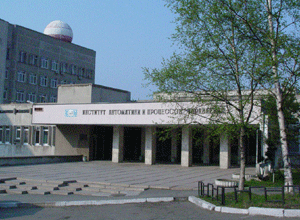
The Institute of Automation and Control Processes with Computation Center of the Far Eastern Scientific Center,
Siberian Branch of the USSR Academy of Sciences, was established on the 1st of June,
1971 on the base of the Department of Technical Cybernetics, Far Eastern Subsidiary,
Siberian Branch, USSR Academy of Sciences by the Order of Presidium of USSR Academy of Sciences No 383, the 20th of May. 1971.
Since its establishment the Institute was focused on fundamental research in the fields of control theory and development
of scientific basics and principles to build the automatized control systems for the enterprises of the national economy
at the Far East of Russia. The Institute also made studies into automation of research, information processing and
technological processes and new facilitiesТ objects control, complex investigation of the World Ocean.
Today the Institute has Federal Institution Status and in incorporated into the Far Eastern Branch of the Russian Academy
of Sciences. It occupies leading position in the field of physics and mathematics and technical sciences. The Institute has 320 employees on the staff. Among 132 scientists there are 1 Full Member of RAS, 3 Corresponding Members of RAS, 5 Honored Scientists of Russian Federation, 1 Honored Inventor of Russian Federation, 33 Doctors of Sciences and 75 PhDs. They make studies into actual fields of sciences as follow: control problems, mathematical modeling of complex systems, informatics, mechanics, laser physics, optoelectronics, surface physics and nanotechnologies.
IACP FEB RAS conducts research by the Programs of Fundamental Research of the FEB RAS Presidium and RAS Branches, Grants of RFBR, RHSF and FEB RAS, state contracts of the Department of Education and Science, Department of Defense of Russian Federation, tasks of the federal and regional public authorities.
The highest Institutes recognition is Lenin Prize, two State Prizes of Russian Federation and Chaplygin Golden Medal of RAS.
There are four leading scientific schools: quantum electronics (Head - Academician Yu. N. Kulchin),
fluid and gas dynamics (Head - Academician of RAS V.A. Levin),
surface physics (Head - Corresponding Member of RAS A.A. Saranin),
theory of elastoplastic deformation in solids (Head - Dr. Sc. (Phys.-Math.), Professor A.A. Burenin).
The scientists actively make investigations into the theory of complex system control and robototechnics (Dr.Sc.(Tech.), Professor O.V. Abramov, Dr.Sc.(Tech.), Professor Rozenbaum, Dr.Sc.(Tech.) A.S. Devyatisilny, Dr.Sc.(Tech.), Professor V.F. Filaretov), matheequiped matical simulation of ecological systems (Dr.Sc.(Phys.-Math.), Professor A.I. Abakumov), computer graphics (Dr.Sc.(Tech.) V.A. Bobkov), supercomputing technology (Dr.Sc.(Phys-Math.), Professor E.A. Nurminsky), satellite monitoring (PhD (Tech.) A.I. Alexanin), informatics theory (Dr.Sc.(Phys.-Math.), Professor A.S. Kleshchev), technical diagnostics (Dr.Sc.(Tech.), Professor V.N. Kinsht, Dr.Sc.(Tech.), Professor V.P. Chipulis).
Administration, Academic Council, Council of Young Scientists and Local Trade Union Organization actively support scientific growth and rejuvenation of the staff. Now the average age of researchers is 43 years. Accessions is provided mainly by the specialists graduated the post-graduate course in the Institute. The Institute has established three Doctor Dissertation Councils in basic scientific directions.
There are six base faculties of the three universities of the Primorsky Region and two educational scientific centers. The part of the leading researchers is at the head of the faculties in other institutes of high-education in Vladivostok.
The Institute has four regional multiplace access centers equipped by modern analytical facilities to conduct fundamental and applied investigations in the main scientific directions. According these facts, the Institute of Automation and Control Processes forecasts its future with optimism.
|